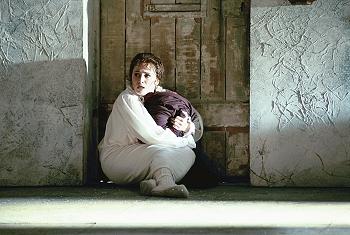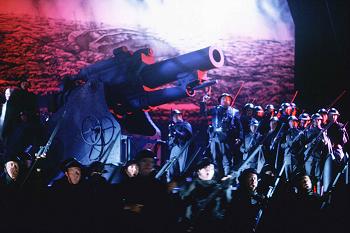|
<< -- 2 -- Roderic Dunnett A MOMENT OF MADNESS

Pamela Rosenberg's own plans for San Francisco are comparably exciting
: they include the American staged première of Messiaen's St
François d'Assise, the complete version of Berlioz's
Les Troyens (a co-production, as it happens, with ENO), Virgil Thomson's
The Mother of Us All, and a new commission (details will emerge in
the autumn) subtitled An American Faust. As at Payne's ENO the San
Francisco season also places a suitably balancing emphasis on Baroque and
Classical.

Patricia Racette as Jenufa in San Francisco Opera's 2001 Production of the Janácek opera. Photo: Larry Merkle
|
During her tenure at Stuttgart (awarded 'Best European Opera Company
of the Year' four times under her leadership by journalists polled by the
opera magazine Opernwelt), the company was especially noted for her
discovery and nurturing of promising artists, its well-judged, inventive
productions, its extensive range of education and training programmes, and
Pamela Rosenberg's parallel skill at building and maintaining a fiscally
sound company.
'Everybody has had financial problems with opera over the past year,'
she says; 'to think otherwise would be naive : we were hit terribly in San
Francisco, and London lost out likewise. If there's a deficit -- and quite
frankly it's not a very large one (ours in San Francisco and those of many
other US companies are much bigger) -- it's categorically not
because the Coliseum and the company have been badly managed by Payne's
administration. Whatever the chairman or the Arts Council may think, you
can't run a serious arts organisation on the basis of profit making; if
that happened, we'd just become a wasteland.'
'Both at Leeds and in London,' she adds, 'Payne by and large took his
audiences with him. There may have been a couple of controversial productions
: I personally liked the Don Giovanni, and had more problems with
A Masked Ball; but Calixto Bieito [who incidentally directs a new
production of Die Fledermaus at Welsh National Opera this September]
had a perfectly logical engagement with both; you certainly can't dismiss
his work out of hand. And of course there have been many others which were
acclaimed (Pelléas, Boris, Manon Lescaut, and Carmelites
are all good examples -- not to mention Payne's succesful revivals of Powerhouse
stagings like Lady Macbeth of Mtsensk).'
'It's not the challenging work that has scared people off -- if indeed
they have been : it's simply patronising not to give ENO audiences credit
for the intelligence that they have; many of these things are not a problem
to them at all.'

Another of the unmatched triumphs of the Payne years : the big guns of Mark-Anthony Turnage's 'The Silver Tassie'
|
'Of all British opera companies ENO has the most rock-solid, respected
reputation on the Continent. Covent Garden may pull up its socks in the
next few years and regain its once enviable reputation (there have already
been signs of that) but ENO has been doing exemplary work continuously over
the last fifteen to twenty years. What's more, it has taken opera to a wider
audience already by doing many productions that had a relevance to, and
spoke to normal persons -- not fusty, not old fashioned, not prim.'
Rosenberg has plenty of knowledge of bold new productions : having participated
in masterclasses as a stage director and a designers' course at the Bayreuth
Festival under Wieland Wagner, and then also furthered her opera studies
at the Guildhall and London Opera Centre, she played an integral part in
the development of the Frankfurt Opera during the Michael Gielen era, where
she served in several capacities between 1974 and 1987, as a stage director,
supervisor of scenic production, and Artistic Administrator.
'The whole revolutionising of opera in England in the 1980s', she recalls,
'actually came about because everyone, from Tom Cairns, Tim Albery, Antony
McDonald, and others, the producers and designers all came out and saw those
Frankfurt productions in those days; and that absolutely influenced what
was seen in England. What's happened is that audiences in Europe and in
England have got much more used to productions that are readings,
fresh interpretations of the score. Like Chereau's "19th century capitalism",
George Bernard Shaw-type reading of the Ring - a few years on, noone
is protesting about it any more.'
Continue >>
Copyright © 29 July 2002
Roderic Dunnett, Coventry, UK
 RODERIC DUNNETT ON THE RESIGNATION OF NICHOLAS PAYNE
ENGLISH NATIONAL OPERA
SAN FRANCISCO OPERA
RODERIC DUNNETT ON THE RESIGNATION OF NICHOLAS PAYNE
ENGLISH NATIONAL OPERA
SAN FRANCISCO OPERA
|

